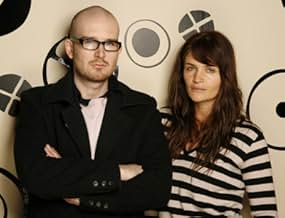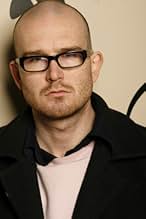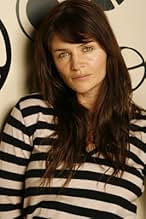Famous pianist Zetterström returns home to his native Denmark, to give a concert, just to find out that the choices he has made in his life have affected his love life greatly.Famous pianist Zetterström returns home to his native Denmark, to give a concert, just to find out that the choices he has made in his life have affected his love life greatly.Famous pianist Zetterström returns home to his native Denmark, to give a concert, just to find out that the choices he has made in his life have affected his love life greatly.
- Director
- Writers
- Stars
- Awards
- 1 win & 6 nominations total
Peder Thomas Pedersen
- Guard 1
- (as Peder Pedersen)
Susanne Storm
- Mor Til Dreng
- (as Susanne Storme)
- Director
- Writers
- All cast & crew
- Production, box office & more at IMDbPro
6.52K
1
2
3
4
5
6
7
8
9
10
Featured reviews
Goes about its idea and what it sets out to do in imaginative and expansive fashion; the end result, of which, we just about take to.
Allegro is an ample Danish drama with redemption at its core, a film arriving with some extravagant ideas and some far reaching ambitions which, for the best part, combine reasonably well. The piece is a constructive and involving character study; a film with an uplifting politic at its core about identifying the importance of one's foundations and of where one came from and a film about the power of memory. Above all else, the film relies on a great deal of surrealism and generally off-kilter content to prop up what is a somewhat simplistic tale of one man returning to his roots so as to eventually confront past mistakes. In short, the surrealism here comes across heartfelt and necessary; it doesn't overwhelm the text as it does in something like Inland Empire. We, the audience, are not buried nor bombarded with a series of tricks or gimmicks – there are no near-unencryptable semiotics plaguing what might very well be a simple story simmering beneath the surface, although both shot and told by an individual too interested in bewildering and alienating. On the contrary, Allegro is passable science fiction applied to a digestible premise somewhat resulting in an enjoyable piece about a man returning to a place, in which he experienced mostly negative life experiences, to do good this time.
Ulrich Thomsen plays the adult incarnation of Zetterstrøm, a young boy from Copenhagen when we first see him, whose snow cone always comes loose from its foundation only to fall on the floor and whose rides on fair ground attractions pack up the moment he gets on them, such is the hard-luck nature of his childhood existence. During these opening segments, of which are nicely animated, he additionally happens upon two things: the equally young Andrea (Christensen) and the creating of piano music. Andrea is good to him; a beacon of light where there was dark. Zetterstrøm then proceedings to abruptly terminate one of these two things, specifically Andrea's presence, when he up's and leaves to pursue his musical career in America in a black hearted fashion.
As years roll by, and either party grow into adults; Zetterstrøm doing well as a musician in his field, Andrea staying where she is, something mysterious befalls a district of their childhood stomping ground, the Danish capital. Principally, a bizarre field of energy causes global news when it lands and both engulfs as well as surrounds a section of the city, thus trapping the people already in there and stopping those on the outside from entering. This part of Copenhagen is re-branded "The Zone", a place terrorising its inhabitants on arrival with bright reds and blue hues flashing around uncontrollably and housing what appears to be diegetic music sounding like the sort of stuff Steve Roach might compose on an off day.
Fittingly, Zetterstrøm is due to return to Copenhagen for a concert stop; he departs America for Europe again, checking himself in his New York City hotel mirror in what is a telling moment of self-reflection in a literal sense with room to grow into a metaphorical one. Later, he will have to confront his own reflective self upon entering this "Zone" when the entering through a restroom mirror takes place. It is here the film mutates into a tale telling of his return, his curiosity and his uncanny interactions with an array of people; not least a glasses wearing man of some age whom seems to think getting Zetterstrøm into The Zone by any means would be a good idea. Further links to the aforementioned Lynch, creator of Inland Empire, rear up here when we think back to a similar character in his 2001 film Mullholland Dr. The writer/director for Allegro, a certain Christoffer Boe, whose ideas here frustratingly outweigh execution, at this point pumps his film with as much life as it ever possesses throughout; paying meek homage to Andrey Tarkovskiy's 1972 film Solyaris and eventually formulating his piece into a film about a guy heading into the unknown to try and tackle why it is certain things are happening - the stumbling across items much more personal and affecting than he first envisaged additionally rearing up.
Allegro is good value for what it is, a story we are able to wrap ourselves up in; off-the-wall content which does what it's supposed to do and remain looming in the background as this central tract of a man righting wrongs takes centre stage. The sense of there being this respective infrastructure to a creative, avant-garde element inserted into proceedings which has its own effect on surroundings we are familiar with feels additionally persistent. There is enough of a sense of adventure as he attempts to seek Andrea, flitting between the inner and outer Zone locale, and whilst the film does not have the power nor the majesty I think it perhaps deserved, Boe strikes us as a creative and enthusiastic filmmaker – the sort of person unafraid of setting bars high but at the same time, both eager and able enough to stick to rigid ground level ideas of character study and generic frills. Here, they total up into a substantial film watching experience.
Ulrich Thomsen plays the adult incarnation of Zetterstrøm, a young boy from Copenhagen when we first see him, whose snow cone always comes loose from its foundation only to fall on the floor and whose rides on fair ground attractions pack up the moment he gets on them, such is the hard-luck nature of his childhood existence. During these opening segments, of which are nicely animated, he additionally happens upon two things: the equally young Andrea (Christensen) and the creating of piano music. Andrea is good to him; a beacon of light where there was dark. Zetterstrøm then proceedings to abruptly terminate one of these two things, specifically Andrea's presence, when he up's and leaves to pursue his musical career in America in a black hearted fashion.
As years roll by, and either party grow into adults; Zetterstrøm doing well as a musician in his field, Andrea staying where she is, something mysterious befalls a district of their childhood stomping ground, the Danish capital. Principally, a bizarre field of energy causes global news when it lands and both engulfs as well as surrounds a section of the city, thus trapping the people already in there and stopping those on the outside from entering. This part of Copenhagen is re-branded "The Zone", a place terrorising its inhabitants on arrival with bright reds and blue hues flashing around uncontrollably and housing what appears to be diegetic music sounding like the sort of stuff Steve Roach might compose on an off day.
Fittingly, Zetterstrøm is due to return to Copenhagen for a concert stop; he departs America for Europe again, checking himself in his New York City hotel mirror in what is a telling moment of self-reflection in a literal sense with room to grow into a metaphorical one. Later, he will have to confront his own reflective self upon entering this "Zone" when the entering through a restroom mirror takes place. It is here the film mutates into a tale telling of his return, his curiosity and his uncanny interactions with an array of people; not least a glasses wearing man of some age whom seems to think getting Zetterstrøm into The Zone by any means would be a good idea. Further links to the aforementioned Lynch, creator of Inland Empire, rear up here when we think back to a similar character in his 2001 film Mullholland Dr. The writer/director for Allegro, a certain Christoffer Boe, whose ideas here frustratingly outweigh execution, at this point pumps his film with as much life as it ever possesses throughout; paying meek homage to Andrey Tarkovskiy's 1972 film Solyaris and eventually formulating his piece into a film about a guy heading into the unknown to try and tackle why it is certain things are happening - the stumbling across items much more personal and affecting than he first envisaged additionally rearing up.
Allegro is good value for what it is, a story we are able to wrap ourselves up in; off-the-wall content which does what it's supposed to do and remain looming in the background as this central tract of a man righting wrongs takes centre stage. The sense of there being this respective infrastructure to a creative, avant-garde element inserted into proceedings which has its own effect on surroundings we are familiar with feels additionally persistent. There is enough of a sense of adventure as he attempts to seek Andrea, flitting between the inner and outer Zone locale, and whilst the film does not have the power nor the majesty I think it perhaps deserved, Boe strikes us as a creative and enthusiastic filmmaker – the sort of person unafraid of setting bars high but at the same time, both eager and able enough to stick to rigid ground level ideas of character study and generic frills. Here, they total up into a substantial film watching experience.
Psychological romantic drama
I went out from the cinema crying. The movie, as all movies in my opinion, removes inside you what you let be removed... I am only 28, and yet, this movie reminds me of how many memories I want to hide, forget, just because my life is based on "keep on living, keep on acting as you decided, don't turn back, because this is imperfection". I don't think the movie is excellent, but it has a specific message (art is made of passion and passion is made of each one's history) and it knew how to express it, how to deal with this psychological side each one of us has. Also the music, mainly J.S. Bach, is beautiful. This is the kind of movie that I would call "of the moment", maybe you won't remember it in a few months, but it inspires you and lives with you unconsciously as a psycho therapy does.
A masterpiece of self abnegation
I'm a big fan of existential folly in film, especially having completed many of my own. Zetterstrøm is the main character in this movie, a world-renowned pianist from Denmark. Since childhood, he is an assiduous "forgetter" of everything except his piano playing. This is to say that he stores up his disappointments, forgets them, and retreats behind a piano. After a love affair that ends due to his emotional constipation, he uses his facultative amnesiac skills once again, and this act is one step too far, so inimical to the fabric of reality, that a rent in reality is formed over three city blocks, and becomes referred to as the "Zone".
Zetterstrøm buries himself in his solitary existence of piano-playing, quite literally performing concerts in the dark, or behind screens so that the audience cannot see him. Shadowy figures draw Zetterstrøm back to the zone, unwilling to allow his non-confrontational existence to continue. Zetterstrøm must be made to confront his past.
It's a fascinating film, the narrator lets us know that it's Zetterstrøm's very brilliance which allows him to annihilate himself, that allows him to inoculate himself from reality.
I'm in absolute adoration of films that attempt to make visual metaphors of the human mind, such a film is this (the Zone fulfils this purpose), Tarsem films such as The Cell and The Fall are others. There is no subject more sacred, more revelatory as regards human potential. There's a scene where Zetterstrøm sits and has dinner in an ornately plastered ballroom. The windows and floor are all blacked out with plastic sheeting, and the room is covered in latched boxes loaded on pallets, representing Zetterstrøm's repressed past, there's also a cage with globes of light in, recognising the potentiality of his mind.
When there's narration we also see some very nice cartoons with Zetterstrøm as a child, that's another metaphor I'm very fond of from The Cell, that many of us are still children inside, just wounded, subdued, and with horrid barriers put up. You may have guessed that this movie moved me deeply.
Zetterstrøm buries himself in his solitary existence of piano-playing, quite literally performing concerts in the dark, or behind screens so that the audience cannot see him. Shadowy figures draw Zetterstrøm back to the zone, unwilling to allow his non-confrontational existence to continue. Zetterstrøm must be made to confront his past.
It's a fascinating film, the narrator lets us know that it's Zetterstrøm's very brilliance which allows him to annihilate himself, that allows him to inoculate himself from reality.
I'm in absolute adoration of films that attempt to make visual metaphors of the human mind, such a film is this (the Zone fulfils this purpose), Tarsem films such as The Cell and The Fall are others. There is no subject more sacred, more revelatory as regards human potential. There's a scene where Zetterstrøm sits and has dinner in an ornately plastered ballroom. The windows and floor are all blacked out with plastic sheeting, and the room is covered in latched boxes loaded on pallets, representing Zetterstrøm's repressed past, there's also a cage with globes of light in, recognising the potentiality of his mind.
When there's narration we also see some very nice cartoons with Zetterstrøm as a child, that's another metaphor I'm very fond of from The Cell, that many of us are still children inside, just wounded, subdued, and with horrid barriers put up. You may have guessed that this movie moved me deeply.
a strangely absorbing mind puzzle
The Danish film, "Allegro," is that rare science fiction film that uses only the barest minimum of special effects to tell its story (a slight wrinkle in the picture is about as high tech as the filmmakers are willing to go). Instead, the fantasy and surrealism play out almost exclusively in that far more intriguing venue known as the Theater of the Mind.
Zetterstrom (well played by Ulrich Thomsen, who appeared in the excellent "Brothers" a few years back) is a concert pianist who has never been able to find true happiness in his life, even after he's met and formed a relationship with Andrea (Helena Christensen), the supposed woman of his dreams. Zetterstrom may be a brilliant musician, but he suffers from an innate distrust of other people, including those who are nearest and dearest to him. When Andrea decides to up and leave him virtually without warning, Zetterstrom imposes a form of amnesia on himself that effectively wipes out all memory of his life prior to her departure. At the same time - and this is where things really get strange - the section of Copenhagen where he was born and raised undergoes a bizarre transformation, suddenly becoming cut off from the rest of the world by some inexplicable supernatural force. Though no one can physically enter this area - now officially re-named The Zone - Zetterstrom is determined to force his way in, when, after ten years of not being able to recall his past, he begins to suspect that his memories may actually be residing in that mysterious place.
Needless to say, this is not your average science fiction movie, nor is it your average tale of lost love. But by combining these two usually distinct genres into a single story, director and co-writer (with Mikael Wulff) Christopher Boe has come up with a work that is both thought-provoking and haunting in its otherworldly strangeness. Zetterstrom wanders through the maze of this "pseudo" city like one in a trance or a dream, searching for clues to his forgotten past and trying to figure out the identity of the strange woman (Andrea) who flits in and out of the shadows of his imagination.
The message of this strange little parable seems to be that even the most tragic events of our lives make up a crucial part of who we are - and that any effort to dull the pain of those events by tucking them away in a corner far out of reach of our memory only winds up diminishing us as a person in the end. Zetterstrom learns that lesson the hard way, but at least he does learn it. It reflects well on the filmmakers that they've presented their case in as uniquely fanciful and absorbing a way as they have in "Allegro."
Zetterstrom (well played by Ulrich Thomsen, who appeared in the excellent "Brothers" a few years back) is a concert pianist who has never been able to find true happiness in his life, even after he's met and formed a relationship with Andrea (Helena Christensen), the supposed woman of his dreams. Zetterstrom may be a brilliant musician, but he suffers from an innate distrust of other people, including those who are nearest and dearest to him. When Andrea decides to up and leave him virtually without warning, Zetterstrom imposes a form of amnesia on himself that effectively wipes out all memory of his life prior to her departure. At the same time - and this is where things really get strange - the section of Copenhagen where he was born and raised undergoes a bizarre transformation, suddenly becoming cut off from the rest of the world by some inexplicable supernatural force. Though no one can physically enter this area - now officially re-named The Zone - Zetterstrom is determined to force his way in, when, after ten years of not being able to recall his past, he begins to suspect that his memories may actually be residing in that mysterious place.
Needless to say, this is not your average science fiction movie, nor is it your average tale of lost love. But by combining these two usually distinct genres into a single story, director and co-writer (with Mikael Wulff) Christopher Boe has come up with a work that is both thought-provoking and haunting in its otherworldly strangeness. Zetterstrom wanders through the maze of this "pseudo" city like one in a trance or a dream, searching for clues to his forgotten past and trying to figure out the identity of the strange woman (Andrea) who flits in and out of the shadows of his imagination.
The message of this strange little parable seems to be that even the most tragic events of our lives make up a crucial part of who we are - and that any effort to dull the pain of those events by tucking them away in a corner far out of reach of our memory only winds up diminishing us as a person in the end. Zetterstrom learns that lesson the hard way, but at least he does learn it. It reflects well on the filmmakers that they've presented their case in as uniquely fanciful and absorbing a way as they have in "Allegro."
Not enough to just forget.
It was a big surprise that I gave this movie. When you think because a photograph is more important than a drawing, in the sense that the picture does capture a moment and freeze-it for all eternity, drawing, photography is made stronger, the film exploits this fact into something dramatically essential to put an omnipotent narrator in the argumentation, which is extremely interesting. Note that does not follow the structure of classical cinema, therefore understanding becomes a challenge, challenge for the viewer who expects to have more elements with which to rebuild those gaps that are present in the argument, leading to an environment discomfort that unfortunately tends to boredom. Ulrich Thomsen's performance manages to articulate a meaning of forgetting how wonderful, considering it's not just forgetfulness, but also, hate, despair and love. In history we find characters that make no sense, that seem to abound, or better yet, seems to be missing something, something like the memories of humans, so variable over time, but strongly tied to the music, which is extremely strong important to understand and feel this film.
Did you know
- Quotes
Zetterstrøm: - But what now... now that I regret?
Tom: - It's a bit late for that, I am afraid.
Zetterstrøm: - So, what do I do now?
Tom: - Well, you can go back to your music, if you want.
- ConnectionsReferenced in iChat mellem Boe og Wulff (2006)
Details
Box office
- Budget
- DKK 10,000,000 (estimated)
- Gross US & Canada
- $7,404
- Opening weekend US & Canada
- $505
- May 13, 2007
- Gross worldwide
- $10,208
- Runtime
- 1h 28m(88 min)
- Color
- Sound mix
- Aspect ratio
- 2.35 : 1
Contribute to this page
Suggest an edit or add missing content































